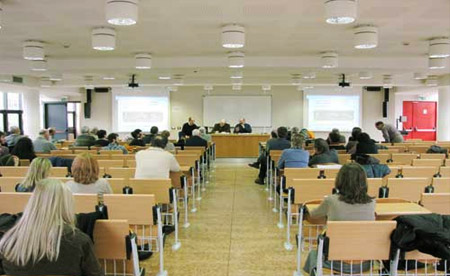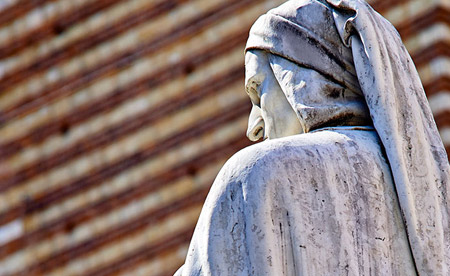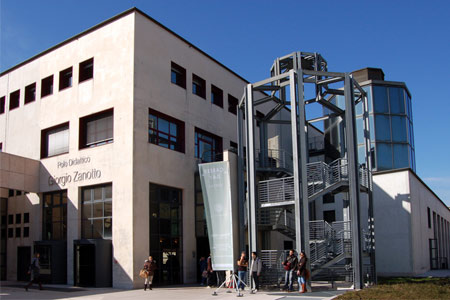Orario di ricevimento
martedì,
Ore 11.00
- 13.00,
Palazzo di Lettere, piano 2, stanza 2.08
Il ricevimento studenti in presenza si svolge presso lo studio 3.18, terzo piano del Polo Zanotto. Sarà però necessario prendere un appuntamento per mail, al fine di evitare assembramenti di studenti in attesa nel corridoio; è anche possibile concordare per mail ricevimenti via skype o zoom o fissare appuntamenti in altri giorni in cui il docente è presente in Dipartimento.
- Curriculum
-
Laureato nel 1979 in Lettere presso la Facoltà di Lettere e filosofia dell’Università di Roma La Sapienza, dopo alcune esperienze lavorative prima nell’insegnamento liceale e poi presso la Scuola Superiore della Pubblica Amministrazione, ha prestato servizio dal 1984 al 1992 come ricercatore di Lingua e letteratura latina presso la Facoltà di Magistero dell’Università di Cassino, e, successivamente alla trasformazione in Facoltà di Lettere e Filosofia, come professore associato di Grammatica latina dal 1992 al 2000 e come professore ordinario di Lingua e Letteratura latina dal 2000 al 2008. Dal 2008 al 2018 è stato professore ordinario di Filologia Classica presso il Dipartimento di Lettere e Filosofia dell’Università di Cassino e del Lazio Meridionale ed è attualmente professore ordinario di Lingua e letteratura latina presso il Dipartimento di Culture e civiltà dell’Università di Verona.
Ha ricoperto numerosi incarichi nell’Ateneo di Cassino: Presidente del Corso di laurea in Lettere (1995-2001), Presidente del Centro Rapporti Internazionali (1993-1997), Prorettore delegato per le Relazioni esterne e i Rapporti internazionali (1997-2001), Prorettore vicario (2001-2007), Preside della Facoltà di Lettere e Filosofia (2003-2007), membro del Consiglio di Amministrazione dell’Università di Cassino e del Lazio Meridionale (1984-1988 e 2016-2018). Ha anche ricoperto numerosi incarichi presso la Commissione Europea, il Ministero dell’Università e varie Università italiane e straniere in materia di programmi di cooperazione europea e di valutazione di programmi di ricerca. Collabora anche con gruppi di lavoro dell’Agenzia per la Valutazione dell’Università e della Ricerca. È stato vice-coordinatore del Nucleo di Valutazione dell'Università Roma Tre. È attualmente direttore del Dipartimento di Culture e Civiltà dell'Università di Verona.
Dal 2014 al 2019 è stato Presidente della Consulta Universitaria di Studi Latini; è inoltre Vice-Presidente del Centro Studi Umanistici ‘Marco Tullio Cicerone di Arpino’ e direttore del Comitato Scientifico del Centro stesso. Nel 1991 ha vinto il XXXII Certamen Capitolinum – sezione giovani, per la sua edizione del trattato grammaticale di Macrobio. Fa parte del Comitato Istituzionale dei Garanti della Cultura classica presso il MIUR.
I suoi interessi di studio sono orientati su figure e tematiche della tarda Latinità, come Macrobio, del cui trattato De verborum Graeci et Latini differentiis vel societatibus ha curato un’edizione critica, e la tradizione grammaticale tardoantica, cui ha dedicato lavori che hanno affrontato modalità di composizione, caratterizzazione e tradizione manoscritta di opere grammaticali minori, come i trattati ortografici di Capro e Agrecio e le Explanationes in Donatum. In questo ambito i suoi lavori si sono sia orientati sul valore di testimonianza linguistica che questa produzione minore riveste per la ricostruzione dell’evoluzione del latino in epoca tarda sia sulle modalità di insegnamento e apprendimento linguistico nella scuola tardoantica, con particolare interesse per il ruolo delle opere di Cicerone nell’insegnamento grammaticale e sulle fasi antiche della tradizione di Catullo.
Un altro campo di interesse è stata la personalità di Orazio ed ha collaborato per vari anni con l’Istituto della Enciclopedia Italiana per la pubblicazione della Enciclopedia Oraziana, di cui è stato caporedattore dal 1996 al 1998.
Coordina un progetto di ricerca per la catalogazione dei manoscritti latini di contenuto grammaticale prodotti entro il sec. XI, e ha diretto il Centro di studi, ricerche e documentazione ‘Civiltà del libro manoscritto e a stampa dall’Antichità al Rinascimento’ presso il Dipartimento di Lettere e Filosofia dell’Università di Cassino; è stato coordinatore del Dottorato di ricerca in ‘Literary and Historical Sciences in the Digital Age’ e ha coordinato numerosi corsi di dottorato presso la medesima Università dal 2008 al 2018. Ha partecipato con suoi interventi a numerosi convegni nazionali e internazionali e ne ha organizzato e diretto vari, fra i quali l’11mo Corso della International School for the Study of Written Records del Centro Majorana di Erice, gli annuali Simposi Ciceroniani organizzati in Arpino dal Centro Studi Umanistici di Arpino, di cui è Vicepresidente, il seminario internazionale Libri e testi. Lavori in corso a Cassino, e il Convegno Internazionale Tra arcaismo e rinnovamento: l’erudizione di età antonina e la formazione del sapere tardo antico / Entre archaïsme et renouvellement: l’érudition à l’époque des Antonins et la formation du savoir tardoantique. Dal 2024 è membro del Comité international pour l'étude du latin vulgaire et tardif.








 depaolis
depaolis univr
univr

